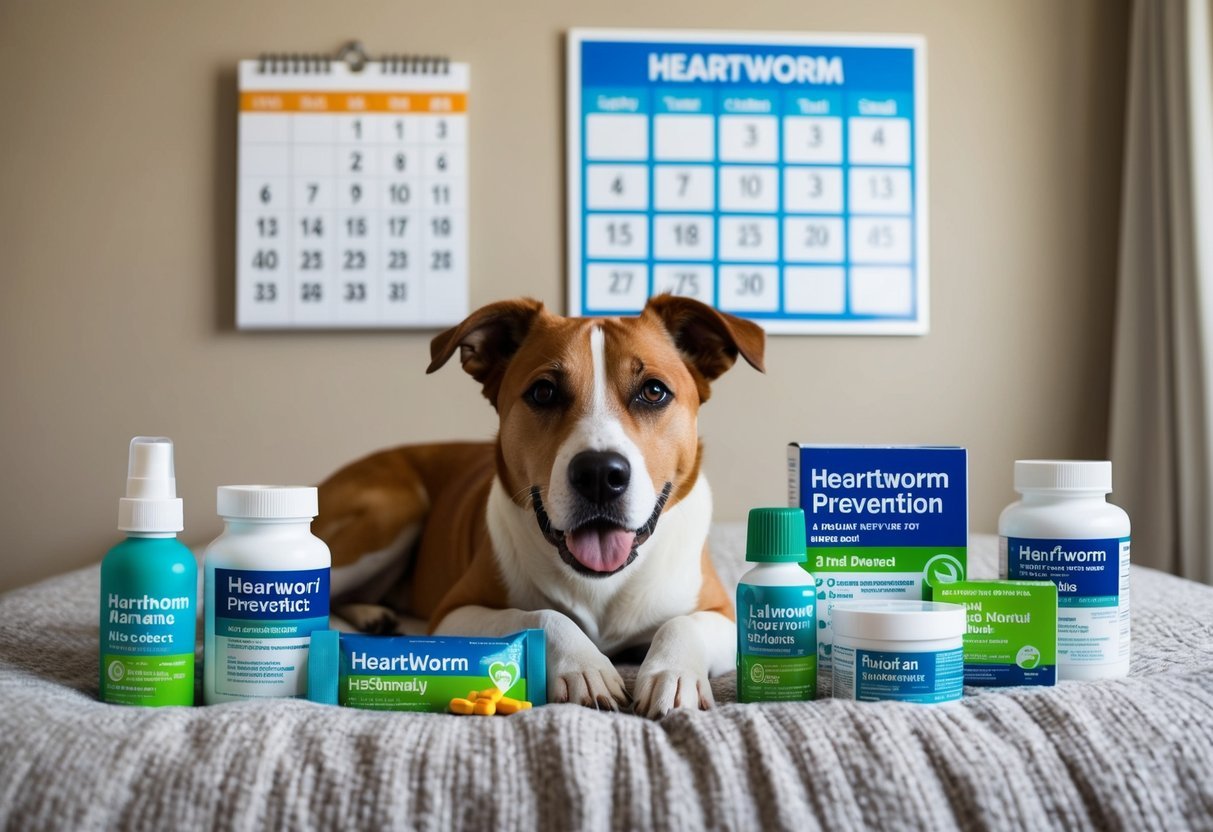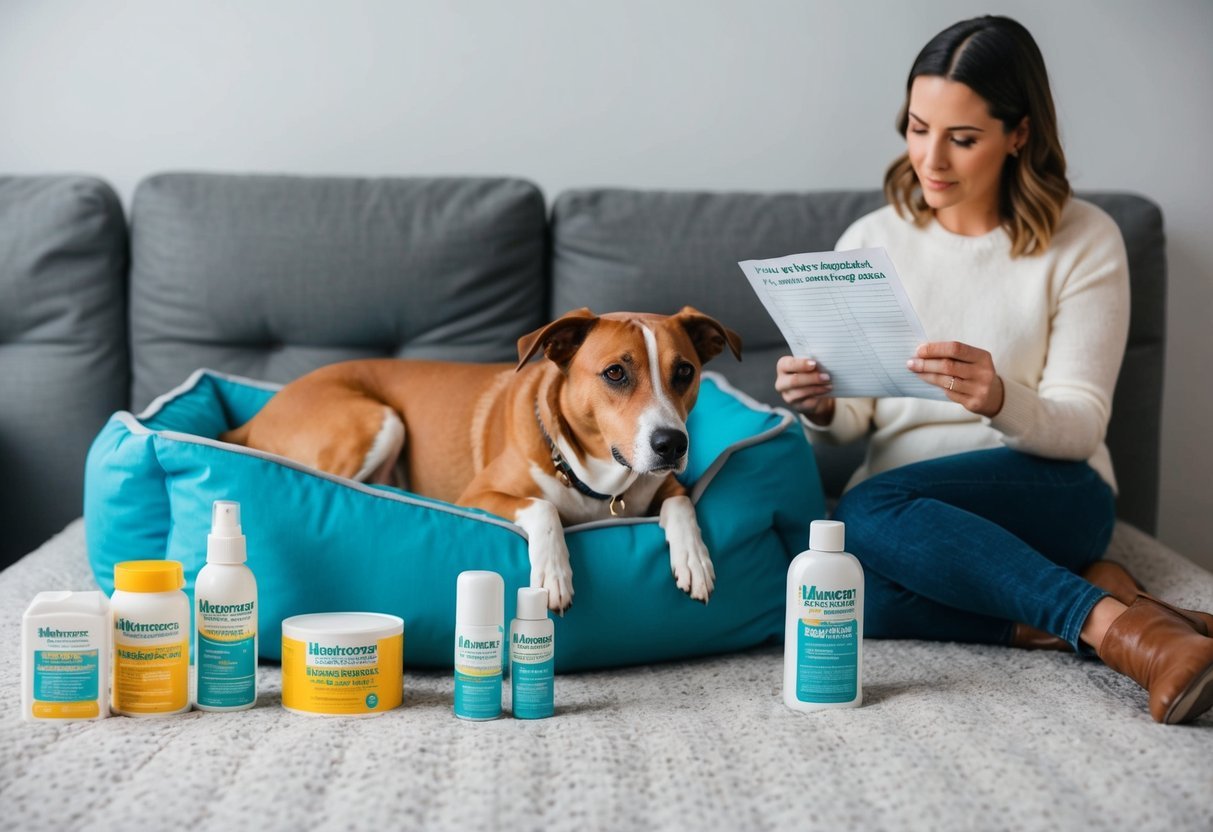Owning a dog comes with a lot of responsibilities, and one of the most important is keeping your furry friend safe from heartworm disease.
Many dog owners underestimate the risks and make mistakes that can put their pets in danger. To keep your dog healthy and happy, you need to know the common pitfalls in heartworm prevention.
Heartworm is a serious and potentially fatal condition that affects dogs of all breeds and sizes.
Preventing it is easier than treating it, yet many still overlook key steps.
Stay informed about the major mistakes you want to avoid and ensure your dog receives the protection they need.
1) Skipping Monthly Heartworm Medications
When it comes to heartworm prevention, consistency is key.
Skipping your dog’s monthly heartworm medication can lead to serious health risks.
Heartworms are dangerous parasites that can damage the heart and lungs.
You might think it’s safe to skip a month, especially in colder seasons.
But heartworm disease is still a risk year-round, as mosquitoes can be active even when it’s cool.
If you miss a dose, give it as soon as you remember.
Restart your regular schedule right after that.
Waiting too long can put your dog at risk for developing heartworm disease.
Always check with your vet if you have any questions about missed doses.
Staying on top of heartworm prevention is one of the best ways to keep your furry friend healthy and happy.
Using Expired Heartworm Preventatives

Using expired heartworm preventatives can be risky.
While some medications may still work after their expiration date, there’s no guarantee.
The effectiveness might decrease, which means your dog could be exposed to heartworms.
You may be tempted to use old meds if they are just slightly past their expiration.
It’s important to remember that heartworm disease is serious and can cost your dog’s life.
Even if the medicine looks fine, it may not protect your pet like it should.
If your dog is at risk or has missed a dose, consult your veterinarian.
They can provide advice on what to do next.
It’s better to invest in effective and current medications rather than gamble with your dog’s health.
Storing heartworm preventatives properly can prolong their life.
Keep them in a cool, dry place to avoid degradation.
Always check the expiration date before giving your dog any medication.
If in doubt, replace expired medications to keep your furry friend safe.
3) Not Testing for Heartworms Annually

Many dog owners skip annual heartworm tests, thinking they aren’t necessary.
This can be a big mistake.
Heartworm disease is serious and can lead to severe health issues for your dog.
Even if your dog is on a prevention plan, it’s still smart to test each year.
A simple blood test can catch heartworms early.
If your dog tests positive, timely treatment is crucial.
Delaying testing might lead to expensive and complicated treatments later.
Some vets recommend annual testing to ensure your dog remains heartworm-free.
If you choose to skip the test, you risk your dog’s health.
Heartworms can cause damage before you even notice symptoms.
Prevention is important, but testing will give you peace of mind.
It’s better to know if your dog is at risk than to find out too late.
If heartworm testing is a concern, consider talking to your vet about options.
Your dog’s well-being should always come first, so don’t overlook this important step.
Protect your furry friend by making heartworm testing part of your annual routine.
4) Purchasing Discounted Medications from Unverified Sources
Buying discounted heartworm medications online can be tempting.
However, it’s important to be cautious about where you’re getting these products.
Many online pharmacies do not meet safety standards.
The National Association of Boards of Pharmacy reported that nearly 95% of online pharmacies fail to meet guidelines for patient safety.
This means you could be getting ineffective or even harmful products for your dog.
Using unverified sources can lead to serious health risks.
Your dog might not get the right dosage or, worse, receive counterfeit meds that do nothing to prevent heartworm disease.
Always choose well-known and reputable pharmacies for your pet’s medication.
It’s worth paying a bit more to ensure your dog’s health and safety.
Remember, a few dollars saved now could cost you much more later in vet bills or, worse, your dog’s life.
5) Ignoring Weight Changes for Dosage Accuracy

When it comes to heartworm prevention, your dog’s weight is key.
The right dosage of medication is based on how much your dog weighs.
If your dog experiences weight changes, you might need to adjust the dose.
A growing puppy can quickly outgrow their current dosage.
If you don’t keep an eye on their weight, they might not get enough medicine to keep them safe from heartworms.
That puts their health at risk.
Even adult dogs can lose or gain weight over time.
Factors like diet, exercise, or health issues can change how much they weigh.
Regular vet check-ups can help spot these changes early.
Make it a habit to weigh your dog regularly.
If you notice a weight change, contact your vet to discuss the best dose for your furry friend.
This simple step can keep your dog protected from dangerous heartworm infections.
6) Believing Heartworm is Only a Warm-Climate Issue

You might think heartworm is a danger only in hot places.
This is a common myth, but it’s not true.
Heartworm can affect dogs in many climates, even those that are cooler.
The disease is spread by mosquitoes, which can thrive in various environments.
While warm, humid areas are hotspots, heartworm cases have been reported in places that get cold in the winter.
Even a brief warm spell can allow mosquitoes to become active and transmit the disease.
Many areas experience seasonal changes that affect mosquito populations.
If you live in a region with some warmth and moisture, your dog could be at risk.
This is why you should consider year-round prevention for heartworm, regardless of where you live.
Skipping prevention because you think heartworm isn’t an issue in your area can be risky.
You may not see immediate signs, but heartworm disease can cause serious health problems for your dog.
Staying informed and protecting your pet is the best way to keep them safe.
7) Failing to Administer a Complete Dose

When it comes to heartworm prevention, giving your dog a complete dose is crucial.
If you don’t administer the full amount, it may not effectively protect your pet from heartworms.
Missing even a small part of the dose could leave your dog vulnerable.
This means that the parasites might still find a way to take hold.
You want to ensure your dog gets the right protection every month, no matter what.
It’s important to follow the dosing instructions carefully.
Double-check the medication you’re using to ensure you’re providing the full dose.
If you’re unsure, consult your vet for guidance.
Establishing a routine can help you stay on track.
You might consider setting a reminder on your phone or keeping a calendar to mark when you give the medication.
This simple step can save your dog from serious health risks.
Understanding Heartworm Disease

Heartworm disease is a serious condition that affects dogs and requires your attention.
Knowing how heartworms affect your dog and the stages of the disease can help you take preventive measures to keep your pet healthy.
How Heartworms Affect Dogs
Heartworms are parasites that live in the arteries of the lungs and the heart.
When a mosquito bites an infected dog, it picks up larvae and can transfer them to your dog when it bites again.
Once inside your dog, these larvae can grow into adult worms, which can live several years and cause various health issues.
Affected dogs may experience fatigue, coughing, and sudden weight loss.
In severe cases, the heartworms can lead to heart failure or even death.
Regular prevention and annual testing can help you keep these dangerous parasites at bay.
Stages of Heartworm Disease
Heartworm disease has several stages, starting with the infection itself.
- Initial Infection: After a mosquito bite, larvae enter your dog’s bloodstream. This stage usually has no visible symptoms.
- Young Heartworms: As the larvae grow into juvenile heartworms, you may notice some mild symptoms, like a cough or slight lethargy.
- Adult Heartworms: At this stage, which typically occurs six months after infection, adult worms can cause severe damage to the heart and lungs.
Regular check-ups and blood tests can catch the disease early.
If you see warning signs, get your dog to the vet.
Fast action can save your dog’s life.
The Importance of Consistent Prevention

Keeping your dog safe from heartworm requires a steady approach to prevention.
Many pet owners aren’t fully aware of some common misconceptions and the necessity of year-round protection.
Here’s what you need to know to help your furry friend stay healthy.
Common Misconceptions
Many people believe heartworm prevention is only necessary during warmer months.
This is misleading.
Heartworms are transmitted by mosquitoes, which can survive even in cooler conditions.
Missing a dose or taking breaks in treatment can lead to serious health risks for your dog.
Another misconception is that heartworm medication isn’t essential if your dog stays indoors.
While being indoors lowers exposure, it doesn’t eliminate the risk.
Mosquitoes can easily find their way inside and still bite your dog.
Regular, consistent heartworm prevention can help protect your pet regardless of lifestyle or season.
Year-Round Protection
To effectively prevent heartworm disease, year-round protection is crucial.
You should administer heartworm medication every month, without fail.
This medication kills any heartworm larvae that may enter your dog’s system, preventing them from growing into adults.
In addition to medication, scheduling annual heartworm tests with your vet is important.
These tests can detect any potential infection early on.
Establishing a routine for prevention and check-ups ensures your dog remains healthy and safe from heartworm disease.
Frequently Asked Questions

Having clear answers to common questions about heartworm prevention is important.
Understanding how to protect your dog is crucial for their health and safety.
How can I prevent heartworm in my dog without a vet prescription?
Some heartworm preventatives are available over the counter.
These often include topical treatments or chews.
Make sure to read the instructions carefully to ensure proper usage.
What’s the likelihood of dogs surviving after heartworm treatment?
Most dogs do respond well to heartworm treatment.
However, the success rate can depend on how advanced the infection is.
Early detection and treatment improve the chances of recovery significantly.
Can you tell if your dog has heartworm by the first symptoms?
The first signs of heartworm are often subtle.
Infected dogs may show mild coughing or lethargy.
By the time noticeable symptoms appear, the disease may have progressed.
Is it really necessary to give my dog heartworm prevention meds?
Yes, giving your dog heartworm prevention medications is essential.
It protects against the disease, which can be severe and even fatal.
Consistency with these medications can save you a lot of trouble later.
What natural methods can I use for heartworm prevention in dogs?
While some people seek natural alternatives, they are not guaranteed.
Essential oils and dietary changes may help, but they should never replace traditional preventative meds.
Always consult your vet before trying any natural options.
Are there any safe heartworm prevention options recommended by holistic vets?
Holistic vets may suggest certain natural products alongside traditional preventive measures.
For example, herbal supplements or homeopathic remedies might be discussed.
It’s important to work closely with a veterinarian to ensure your dog’s safety and well-being.

